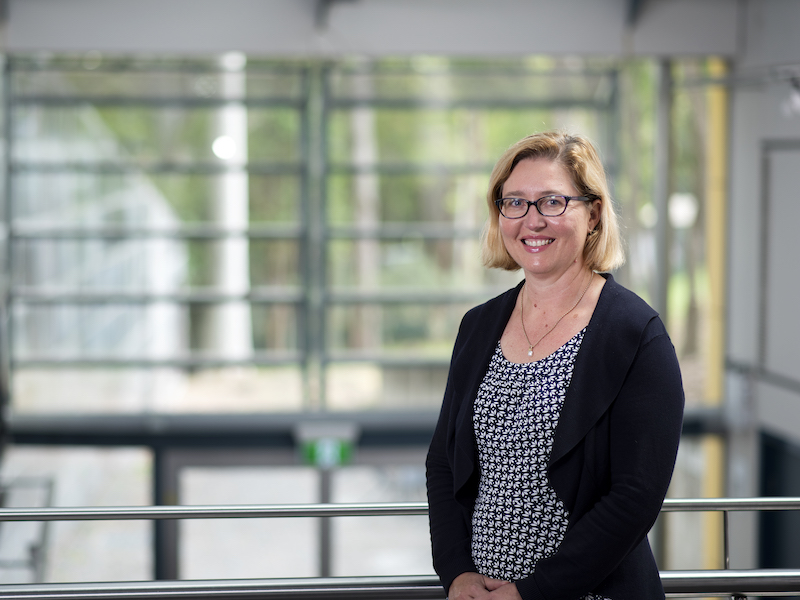Researcher Highlights
The inside story
Melissa Shields
With a passion for nuclear medicine, Melissa Shields is educating a whole new generation in a diagnostic method that helps us see a bigger picture of what’s going on in our bodies.

Melissa Shields was originally interested in studying radiography, but after having a nuclear medicine scan as a teen she was intrigued enough by the process to switch direction. “I remember thinking, ‘Oh, this is so much more interesting than regular x-rays,’.”
When Nuclear Medicine was offered for the first time at UON just when Melissa was graduating High School it just seemed destined for her to follow this path.
On the inside
Nuclear Imaging affords an insight into the body that regular scans can’t offer. “With nuclear medicine we’re looking at how the organs are functioning, so we find things a lot earlier than with a traditional x-ray or CT scan,” Melissa says. “This is because X-ray and CT are anatomical imaging, but nuclear medicine is functional as well so we’ll see how things are functioning, and if they’re not functioning properly, then more of the radioactive injection will move to the affected part of the body.”
“For example, if you’ve got a tiny stress fracture, or shin splints from running, well you may not see that on a traditional x-ray. But because the bone is trying to heal and remodel itself then we’ll see that with nuclear imaging.”
While a lot of nuclear medicine is in oncology, it’s also used in sports medicine and heart disease. “With heart disease, we actually look at the blood flow to the heart muscle so we can tell which of the arteries aren’t moving enough blood when the heart’s pumping,” Melissa says. “We can also look at other organs such as the gall bladder to see if it’s not functioning well.”
Early intervention
The real benefits in nuclear medicine lie in being able to detect problems much earlier than other diagnostic imaging. “We can detect cancer earlier than other modalities as we do not need an alteration in the size or structure of the tumour to detect active cancer cells.”
Obviously this has enormous implications for treatment outcomes which are much more promising because early intervention is possible. However, the challenge lies in the cost and availability of nuclear medicine services. Not every patient can have access to nuclear medicine technologies if and when they want it.
Melissa would like to see change with early access to better options for patients who need it – rather than just those who can afford it.
However, training the next generation of clinicians is where Melissa really finds satisfaction. “I’m happy to be doing what I’m doing,” she says. “I want to be involved in teaching and learning as well as my research on the side.
Studying the practitioners
Currently working on her PhD, Melissa is exploring the complex issue of burnout in nuclear medicine technologists, “I’m pretty sure that I went through some kind of burnout when I was working because you’re often the only person working in your area,” Melissa confides. “So you can’t take leave, you can’t have sick leave, and whenever you do take any kind of extended leave you come back to even more work because it’s so hard to find a replacement to fill in for you.”
Melissa admits that it’s a complex problem to explore, because it needs to be addressed by both the companies that employ the staff, and also individuals at risk of burnout. “I’m hoping that with my research I can help identify some of the signs of burnout so that people can recognize them and I can also offer up some ideas for dealing with them.”
Melissa’s student cohort faced a whole new challenge in 2020. “Because of COVID-19, the students didn’t have a chance to go out on placement,” she says. But they rose to the challenge and explored options to improve their learning. “Watching them and seeing what they’ve done and learnt instead of placement really fills me with joy.”
Melissa’s passion for teaching is evident when she speaks about her students. “My favourite moment is watching them and seeing when everything clicks and they just ‘get it’,” Melissa says. “I get real satisfaction knowing that they understand what it is that I’m trying to teach them.”
Her work is obviously resonating with her students and colleagues as Melissa was nominated for a Teaching Excellence Award in 2020. “That just meant so much to me. I had no idea I was being nominated.”
As to the future? “My goal is this, what I’m doing right now,” Melissa says. “Anything else is a bonus.”
The University of Newcastle acknowledges the traditional custodians of the lands within our footprint areas: Awabakal, Darkinjung, Biripai, Worimi, Wonnarua, and Eora Nations. We also pay respect to the wisdom of our Elders past and present.
